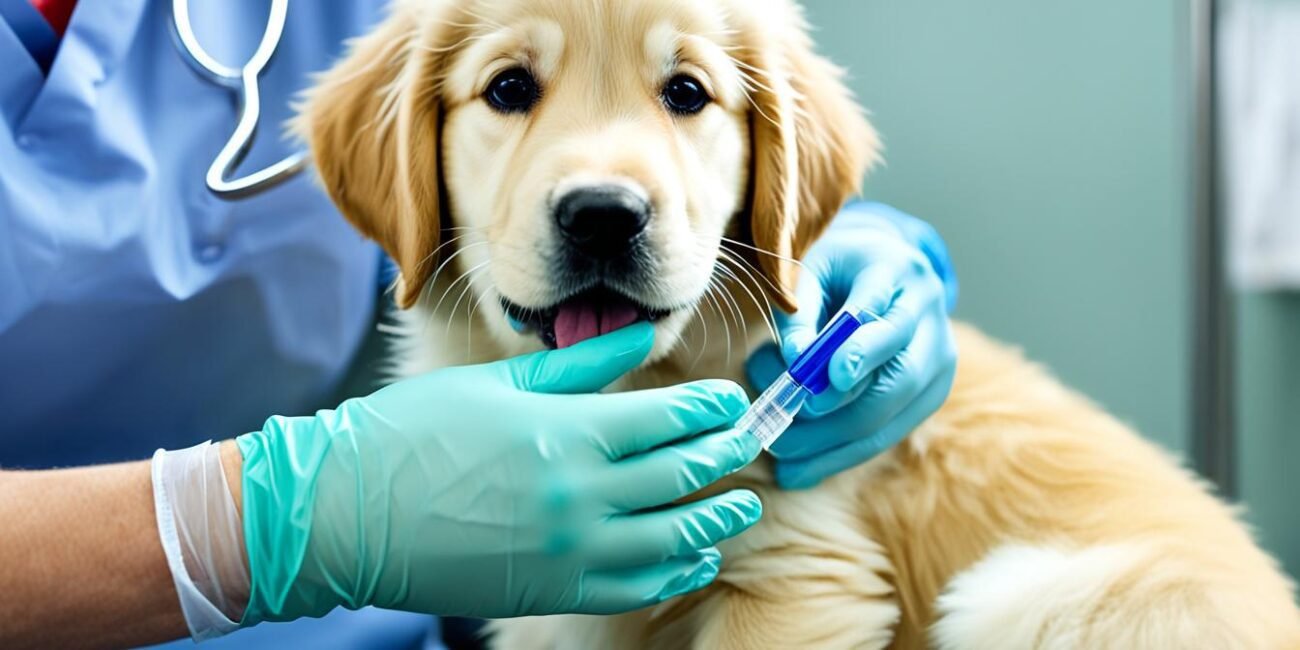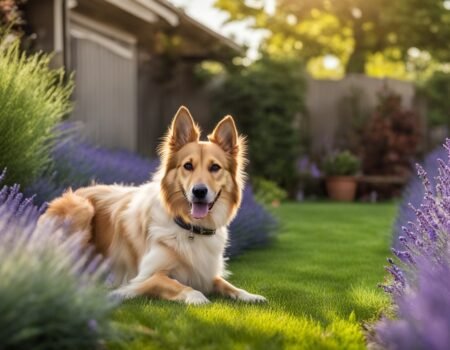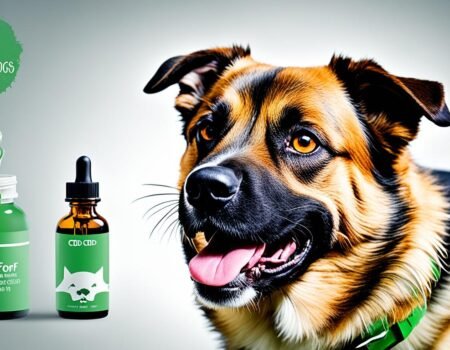Bringing home a Golden Retriever puppy is an exciting time, but it also requires careful preparation and planning. We all want our furry friends to be healthy and happy, but what are the essential steps to ensure their well-being from a young age? Are there any common misconceptions or overlooked aspects of Golden Retriever puppy care?
In this comprehensive guide, we will provide you with essential information and tips on how to ensure the health and well-being of your new furry friend. From supplies and nutrition to grooming and training, we’ve got you covered. Let’s dive in and discover the key ingredients for a healthy and thriving Golden Retriever puppy!
Key Takeaways:
- Preparing for your Golden Retriever puppy involves having the right supplies and equipment on hand.
- Puppy-proofing your home is essential to create a safe environment for your curious Golden Retriever.
- Choosing the right collar and leash is important for comfort and control during walks.
- Feeding your Golden Retriever puppy a balanced and age-appropriate diet is crucial for their growth and development.
- Grooming your puppy regularly helps maintain their health, appearance, and prevents potential issues.
Preparing for Your Golden Retriever Puppy
Before bringing your Golden Retriever puppy home, it’s important to make sure you have all the necessary supplies. Being well-prepared will help create a comfortable and safe environment for your new furry friend.
Gather Your Golden Retriever Puppy Supplies
Here is a checklist of essential items you’ll need:
- A collar, leash, and harness for walks and outings
- Food and water bowls for mealtime
- A crate or kennel for crate training and a safe space
- Dog toys to keep them entertained and stimulated
- Training treats for positive reinforcement during training sessions
- Grooming supplies such as a brush, shampoo, and nail clippers
- Cleaning essentials like puppy potty pads and stain removers
Having these supplies ready will make the transition smoother and ensure you have everything you need to care for your new Golden Retriever puppy.
| Supplies | Quantity |
|---|---|
| Collar, leash, and harness | 1 set |
| Food and water bowls | 2 |
| Crate or kennel | 1 |
| Dog toys | Multiple |
| Training treats | 1 bag |
| Grooming supplies | Brush, shampoo, nail clippers |
| Cleaning essentials | Puppy potty pads, stain removers |
By ensuring you have these supplies on hand, you’ll be well-prepared to welcome your Golden Retriever puppy into your home and provide them with all they need to thrive.
“Being well-prepared will help create a comfortable and safe environment for your new furry friend.”
Puppy Proofing Your Home
Puppies are incredibly curious and can get into all sorts of mischief. To ensure the safety of your new furry friend, it’s essential to puppy-proof your home. By taking a few simple precautions, you can create a secure environment that allows your puppy to explore and play safely.
Hazards to Watch Out For
Here are some common hazards that you should be aware of and address:
- Toilet Lids: Keep toilet lids closed to prevent your puppy from drinking potentially harmful chemicals or falling in.
- Medicine and Cleaning Products: Secure all medications and cleaning products in cabinets or drawers that are out of your puppy’s reach.
- Lidded Garbage Cans: Use garbage cans with secure lids to prevent your puppy from rummaging through potentially hazardous waste.
- Electrical and Blind Cords: Hide or secure electrical cords and blind cords to prevent your puppy from chewing on them, which can lead to electric shock or choking.
Limiting Access
Another effective way to ensure your puppy’s safety is by using pet or baby gates to limit access to certain areas of your home. This will prevent them from entering rooms where they may encounter potential hazards or damage valuable items.
“Puppy-proofing your home is a crucial step in creating a safe and secure environment for your new furry friend.”
By implementing these puppy safety tips and precautions, you can minimize the risk of accidents and keep your puppy safe as they explore their new surroundings. Remember, puppies are naturally curious and prone to getting into trouble, so it’s important to stay vigilant and continually assess the safety of your home.
Choosing the Right Collar and Leash
When it comes to outfitting your adorable Golden Retriever puppy, finding the perfect collar and leash is essential for their comfort, safety, and control during walks and outdoor adventures. Here are a few factors to consider:
Age and Size
Take into account your puppy’s age and size when selecting a collar. A smaller collar is suitable for young puppies, while adult Golden Retrievers will require a larger collar for a secure fit. It’s important to choose a collar that allows for adjustment as your puppy grows.
“Finding the right collar size ensures comfort and prevents any discomfort or injury to your furry friend.”
Comfort and Durability
Opt for a collar made from a comfortable material, such as nylon or leather, to prevent irritation and chafing. Additionally, choose a collar that is durable and can withstand your puppy’s playful antics. Double stitching and reinforced hardware can offer added durability and peace of mind.
Identification Tags
Ensure your puppy’s collar has enough space to hold identification tags with essential contact information. This is crucial in case your puppy ever gets lost. Look for collars with a dedicated tag loop or built-in tag attachment points.
Leash Control
Selecting the right leash is just as important as choosing the right collar. Look for a leash that provides control and allows you to comfortably guide your puppy during walks. A leash made from sturdy materials like nylon or leather is recommended for optimal control and durability.
“Having control over your puppy’s leash enhances safety and allows for effective training.”
Comfortable Handle
Consider a leash with a soft, padded handle that offers a comfortable grip during walks. This prevents hand fatigue and improves the overall walking experience for both you and your puppy.
Summary
Choosing the right collar and leash for your Golden Retriever puppy is crucial for their comfort, safety, and control. Take into account their age and size, prioritize comfort and durability, ensure space for identification tags, and select a leash that provides control while offering a comfortable handle. By doing so, you can ensure enjoyable and stress-free walks with your furry friend.
| Factors to Consider | Details |
|---|---|
| Age and Size | Choose a collar that fits your puppy’s age and size, allowing for adjustment as they grow. |
| Comfort and Durability | Select a collar made from comfortable and durable materials to prevent irritation and withstand playful activities. |
| Identification Tags | Ensure the collar has space for identification tags with essential contact information in case your puppy gets lost. |
| Leash Control | Select a leash that provides control and allows for effective training during walks. |
| Comfortable Handle | Consider a leash with a padded handle for a comfortable grip and improved walking experience. |
Nutrition and Feeding Guidelines for Golden Retriever Puppies
Feeding your Golden Retriever puppy is a crucial aspect of their overall health and well-being. It’s essential to provide them with high-quality, age-appropriate food that supports their growth and development. Consult with your veterinarian to determine the best diet for your puppy, taking into consideration their breed, age, and specific nutritional needs.
Proper nutrition is the foundation for a healthy and happy Golden Retriever puppy. Here are some feeding guidelines to ensure they are getting the right nutrients:
Age-Appropriate Food:
Choose a puppy formula specifically designed for Golden Retrievers or large breed puppies. These formulas contain the optimal balance of nutrients, including protein, vitamins, and minerals, to support their growing bodies. Avoid feeding adult dog food to puppies, as it may not meet their nutritional requirements.
Measured Portions:
It’s important to provide your Golden Retriever puppy with measured and controlled portions throughout the day. Follow the feeding guidelines provided on the food packaging or consult with your veterinarian for personalized recommendations based on your puppy’s age, weight, and activity level.
Feeding Schedule:
Establish a consistent feeding schedule for your puppy. Ideally, puppies should be fed three to four times a day when they are young, gradually transitioning to two meals a day as they get older. Stick to a regular feeding routine to help with digestion and prevent overeating.
Quality Ingredients:
Ensure that the food you choose for your Golden Retriever puppy contains high-quality ingredients. Look for formulas that list real meat as the first ingredient and avoid products that include fillers, artificial preservatives, and additives.
Supplements:
In addition to a balanced diet, your veterinarian may recommend specific supplements to support your Golden Retriever puppy’s overall health. These supplements can include omega-3 fatty acids for healthy skin and coat, glucosamine for joint health, and probiotics for digestion.
Remember to always have fresh water available for your puppy. Hydration is essential for their overall well-being.
Feeding your Golden Retriever puppy the right food in the correct portions is crucial for their development and long-term health. Consult with your veterinarian for personalized recommendations and seek their advice if you have any concerns about your puppy’s nutrition.
| Feeding Guidelines for Golden Retriever Puppies | Age | Portions per Day |
|---|---|---|
| Puppy Formula | 8-12 weeks | 3-4 meals (1/3 – 1/2 cup each) |
| Puppy Formula | 3-6 months | 3 meals (1/2 – 2/3 cup each) |
| Puppy Formula | 6-12 months | 2 meals (2/3 – 1 cup each) |
“Feeding your Golden Retriever puppy the right food and following proper guidelines is essential for their growth and development.” – Golden Retriever Owners
Grooming Your Golden Retriever Puppy
Regular grooming is essential for maintaining the health and appearance of your Golden Retriever puppy. Proper grooming not only keeps them looking their best but also helps prevent skin issues and dental problems. Below are some essential grooming tasks to include in your puppy’s care routine:
- Brushing Their Coat: Regular brushing helps keep your puppy’s coat clean and free from tangles. Use a slicker brush or a comb specifically designed for Golden Retrievers to remove loose hair and prevent matting. Brushing also helps distribute natural oils and stimulates the skin.
- Bathing: Give your puppy a bath using dog-specific shampoo and conditioner. Make sure to use lukewarm water and thoroughly rinse off all the products to prevent skin irritation. Frequency of bathing depends on your puppy’s activity level and coat condition.
- Teeth Brushing: Brushing your puppy’s teeth is crucial for maintaining good oral health. Use a dog toothbrush and toothpaste to remove plaque and prevent dental issues. Start introducing teeth brushing at a young age to get them comfortable with the process.
- Ear Cleaning: Check your puppy’s ears regularly and clean them if necessary. Use a dog-specific ear cleaning solution and a cotton ball. Gently wipe the inner ear, avoiding the ear canal. Regular ear cleaning helps prevent infections.
Grooming supplies you’ll need for your Golden Retriever puppy include a slicker brush, comb, dog-specific shampoo and conditioner, toothbrush and toothpaste, ear cleaning solution, and cotton balls. Having the right grooming supplies ensures that you can properly care for your puppy’s grooming needs.
“Regular grooming not only keeps your Golden Retriever puppy looking their best but also helps prevent skin issues and dental problems.”
Remember, every Golden Retriever puppy is unique and may have specific grooming needs. It’s essential to consult with your veterinarian or a professional groomer for personalized advice and recommendations. By establishing a regular grooming routine, you’ll be able to keep your furry friend healthy and happy.
| Grooming Task | Frequency | Benefits |
|---|---|---|
| Brushing Their Coat | 2-3 times a week | Removes loose hair, prevents matting, and stimulates the skin |
| Bathing | As needed | Maintains cleanliness and removes dirt and odors |
| Teeth Brushing | Daily | Prevents plaque buildup and maintains good oral health |
| Ear Cleaning | Once a month or as needed | Prevents ear infections and maintains ear hygiene |
Training and Socializing Your Golden Retriever Puppy
Training and socializing your Golden Retriever puppy is crucial for their development and well-being. As responsible dog owners, we want to ensure that our furry friends grow up to be well-behaved and confident in various situations. Here are some essential training and socialization tips for your Golden Retriever puppy:
Basic Obedience Training
Start with basic obedience training as soon as you bring your Golden Retriever puppy home. Teach them simple commands like sit, stay, and come. Use positive reinforcement techniques such as treats, praise, and playtime to reward good behavior. Consistency and patience are key to successful training.
Introduce Them to Different Environments
Gradually introduce your Golden Retriever puppy to different environments to help them adapt and feel comfortable in various settings. Take them for walks in the neighborhood, visit dog-friendly parks, and expose them to different sounds, sights, and smells. This exposure will help them to develop confidence and reduce anxiety in new situations.
Socialize with Different People and Animals
Allow your Golden Retriever puppy to interact with a variety of people, including family members, friends, and strangers. Encourage positive interactions and provide treats and praise when they behave well. It’s important to expose them to different animals as well, such as friendly dogs, cats, and other pets, to promote socialization.
Positive Reinforcement and Consistency
Use positive reinforcement techniques, such as treats and praise, to reward your Golden Retriever puppy for good behavior during training and socialization. Consistency is key, so make sure to establish clear rules and expectations from the beginning. Be patient and understanding, as puppies take time to learn and understand commands.
“Training and socializing your Golden Retriever puppy lays a strong foundation for their future behavior and happiness.”
By training and socializing your Golden Retriever puppy, you are setting them up for a lifetime of good behavior and positive experiences. Remember, every interaction is an opportunity for learning and growth. Be patient, stay consistent, and enjoy the journey of watching your Golden Retriever puppy flourish into a well-adjusted and confident companion.
Exercise and Playtime for Golden Retriever Puppies
Golden Retriever puppies are full of energy and love to play! Regular exercise and playtime are essential for their physical and mental well-being. By engaging in activities that promote movement and stimulation, you can keep your puppy happy, healthy, and entertained.
Here are some tips to help you provide your Golden Retriever puppy with the exercise and playtime they need:
- Set aside dedicated time: Aim for two to three 20-30 minute exercise and play sessions per day. Having a consistent schedule helps establish a routine and allows your puppy to anticipate and look forward to their activity time.
- Take them for walks: Walking is a great exercise for Golden Retrievers, as it provides both physical activity and mental stimulation. Explore different routes to keep things interesting, and consider using a harness to ensure comfort and control while walking.
- Play in the backyard: Having a safe and secure backyard allows your puppy to run freely and burn off excess energy. Provide them with toys, such as balls or frisbees, to encourage active play and chase games.
- Engage in interactive play: Golden Retrievers are intelligent and enjoy interactive toys that challenge their problem-solving skills. Puzzle toys, treat dispensers, or hide-and-seek games can keep them mentally stimulated and entertained.
Remember to consider your puppy’s age and physical capabilities when planning their exercise and playtime. Avoid strenuous activities that could harm their developing bones and joints. If you have any concerns about your puppy’s exercise routine, consult with your veterinarian for guidance and recommendations.
Regular exercise not only helps burn off excess energy but also promotes proper muscle and bone development in Golden Retriever puppies. Creating a fun and engaging exercise and playtime routine enhances the bond between you and your puppy while keeping them happy and healthy.
Dental Care for Golden Retriever Puppies
Taking care of your Golden Retriever puppy’s dental health is crucial for preventing dental issues later in life. Just like humans, dogs can develop plaque, tartar, and gum disease if proper dental care is not maintained. By implementing a regular dental care routine, you can help ensure that your puppy’s teeth and gums stay healthy and strong.
Introducing Tooth Brushing at a Young Age
Brushing your Golden Retriever puppy’s teeth should begin as early as possible to acclimate them to the process. Start by gently introducing a dog toothbrush and toothpaste specifically designed for dogs. Using a small, soft-bristled toothbrush, apply a small amount of toothpaste and gently brush their teeth and gums in a circular motion. Be patient and consistent, gradually increasing the duration of each brushing session over time.
Regular Dental Check-ups
While regular tooth brushing at home is essential, it’s also important to schedule regular dental check-ups with your veterinarian. A professional dental cleaning can effectively remove any plaque or tartar buildup that cannot be addressed through brushing alone. Your veterinarian can also identify any early signs of dental issues or abnormalities and provide appropriate treatment.
Tips for Healthy Teeth and Gums
- Provide appropriate chew toys that help clean your puppy’s teeth and massage their gums.
- Choose a balanced diet consisting of high-quality dog food to promote overall dental health.
- Avoid feeding your puppy hard or sticky treats that can contribute to dental problems.
- Monitor your puppy’s teeth and gums regularly for any signs of redness, swelling, or abnormal odor.
- Consult with your veterinarian for additional dental care recommendations specific to your Golden Retriever puppy’s needs.
Remember, maintaining good dental care for your Golden Retriever puppy not only promotes their oral health but also contributes to their overall well-being. By incorporating regular tooth brushing and dental check-ups into your puppy’s routine, you can help ensure that they have a lifetime of healthy smiles.
Weight Management for Golden Retriever Puppies
Golden Retrievers are known for their love of food, which makes weight management an essential aspect of their overall health and well-being. Without proper weight management, these adorable puppies can easily become overweight or obese, leading to various health issues down the line. To ensure a healthy weight for your Golden Retriever puppy, follow these tips:
- Consult with your veterinarian: Schedule a visit with your veterinarian to discuss your puppy’s weight and receive personalized advice. They can help determine the appropriate feeding portions based on your puppy’s age, size, and activity level. Regular check-ups will also allow your vet to monitor your puppy’s weight and make any necessary adjustments.
- Avoid overfeeding: It can be tempting to give in to those puppy eyes, but overfeeding can quickly lead to weight gain. Stick to the recommended feeding portions provided by your veterinarian and resist the urge to give your puppy extra treats or table scraps. Remember, treats should be given in moderation and should not make up a significant portion of their daily calorie intake.
- Provide regular exercise: Regular physical activity is essential for maintaining a healthy weight in Golden Retriever puppies. Engage in daily walks, playtime in the backyard, or interactive games to keep your puppy active and burn off excess energy. Not only will exercise prevent weight gain, but it will also promote proper muscle and bone development.
- Monitor their weight: Keep an eye on your puppy’s weight by regularly weighing them at home or during vet visits. Sudden weight changes can indicate a need for adjustments in their feeding or exercise routine. If you notice any significant weight gain or loss, consult with your veterinarian.
“Weight management is key to keeping your Golden Retriever puppy healthy and avoiding the risk of obesity. By consulting with your veterinarian, avoiding overfeeding, providing regular exercise, and monitoring their weight, you can ensure your puppy grows up to be a fit and happy companion.”
By implementing these weight management strategies, you can help prevent your Golden Retriever puppy from becoming overweight or obese, reducing the risk of associated health problems such as joint issues, diabetes, and heart disease. Remember, maintaining a healthy weight is an essential part of ensuring a long and happy life for your furry friend.
Vaccinations and Health Care for Golden Retriever Puppies
Vaccinations play a crucial role in protecting your golden retriever puppy from common diseases. Following your veterinarian’s recommended vaccination schedule is essential to ensure your puppy’s immunity. By staying up to date on vaccinations, you can help safeguard your puppy’s health and well-being.
Regular check-ups with your veterinarian are vital for maintaining your golden retriever puppy’s overall health. During these visits, your veterinarian will perform thorough examinations, monitor growth, and address any concerns you may have. These check-ups allow early detection of potential health issues and enable prompt treatment.
Preventive care, such as flea and tick control, is also essential for your puppy’s health. Fleas and ticks can carry diseases and cause discomfort for your furry friend. Using veterinarian-recommended flea and tick prevention products can help keep your golden retriever puppy protected.
It is important to be proactive in addressing any health concerns that arise. If you notice changes in your puppy’s behavior, appetite, or energy levels, or if they exhibit any signs of illness, it’s crucial to seek veterinary care promptly. Early intervention can make a significant difference in the outcome of your puppy’s health.
Remember, as responsible pet owners, it is our duty to provide the best possible health care for our golden retriever puppies. By following proper vaccination protocols, scheduling regular check-ups, and addressing health concerns promptly, we can ensure our furry friends have a happy and healthy life.
Vaccination Schedule for Golden Retriever Puppies
| Vaccine | Age | Recommended Frequency |
|---|---|---|
| DHPP | 6-8 weeks | Every 3-4 weeks until 16 weeks, then annual boosters |
| Rabies | 12-16 weeks | Annual or as per local regulations |
| Bordetella | 12-16 weeks | Every 6-12 months depending on exposure risk |
| Leptospirosis | 12-16 weeks | Every 6-12 months depending on exposure risk |
| Lyme Disease | 12-16 weeks | Every 6-12 months depending on exposure risk |
Conclusion
Bringing a Golden Retriever puppy into your home is an exciting and rewarding experience. As responsible pet owners, it is important to prioritize their health and well-being. By following this comprehensive puppy care guide, you can provide your furry friend with the essentials they need to thrive.
Proper nutrition is the foundation of good health. Ensure that you feed your Golden Retriever puppy a balanced diet and consult with your veterinarian for personalized advice. Regular grooming not only keeps your puppy looking their best, but it also prevents potential skin issues and dental problems.
Training and socialization are vital for your puppy’s development. With positive reinforcement and consistency, you can teach them essential commands and help them become well-adjusted and confident in various situations. Additionally, regular exercise and playtime are crucial for their physical and mental well-being.
Throughout your journey of raising a Golden Retriever puppy, remember to consult with your veterinarian for any specific health concerns or questions you may have. With the right care, love, and attention, your furry companion will grow up to be a happy and healthy member of your family.
FAQ
What supplies do I need to have for my Golden Retriever puppy?
Some essential supplies include a collar, leash, harness, food and water bowls, crate, dog toys, training treats, grooming supplies, and cleaning essentials.
How can I puppy-proof my home?
Puppy-proofing your home involves keeping toilet lids closed, securing medicine and cleaning products, using lidded garbage cans, hiding electrical and blind cords, and using pet or baby gates to limit access to certain areas.
What should I consider when choosing a collar and leash for my Golden Retriever puppy?
Consider their age and size, and choose a comfortable and durable collar that can hold identification tags. Similarly, select a leash that provides control and is comfortable to hold.
What type of food should I feed my Golden Retriever puppy?
Consult with your veterinarian to determine the best diet for your puppy. It’s important to provide measured portions of high-quality, age-appropriate food throughout the day to ensure they get the necessary nutrients.
How do I groom my Golden Retriever puppy?
Regular grooming involves brushing their coat, bathing them with dog shampoo and conditioner, brushing their teeth, and cleaning their ears. This helps maintain their health, appearance, and prevents skin issues and dental problems.
How do I train and socialize my Golden Retriever puppy?
Start with basic obedience training and gradually introduce them to different environments, people, and animals. Positive reinforcement and consistency are key. Socialization helps them become well-adjusted and confident.
How much exercise does my Golden Retriever puppy need?
Aim for two to three 20-30 minute exercise and play sessions per day. This can include walks, playtime in the backyard, and interactive toys. Exercise promotes their health and proper muscle and bone development.
How do I take care of my Golden Retriever puppy’s dental health?
Start by introducing them to tooth brushing at a young age using dog toothbrush and toothpaste. Regular dental check-ups with a veterinarian are also important for their teeth and gum health.
How can I manage my Golden Retriever puppy’s weight?
Consult with your veterinarian to determine the appropriate feeding portions and monitor their weight regularly. Avoid overfeeding and provide regular exercise to prevent obesity and related health issues.
What vaccinations does my Golden Retriever puppy need?
Follow your veterinarian’s recommended vaccination schedule to protect your puppy from common diseases. Regular check-ups and preventive care are important for maintaining their overall health.
How can I ensure the health and well-being of my Golden Retriever puppy?
By following this guide and providing proper nutrition, grooming, training, and healthcare, you can ensure that your furry friend grows up happy and healthy. Consult with your veterinarian for personalized advice.











No Comment! Be the first one.